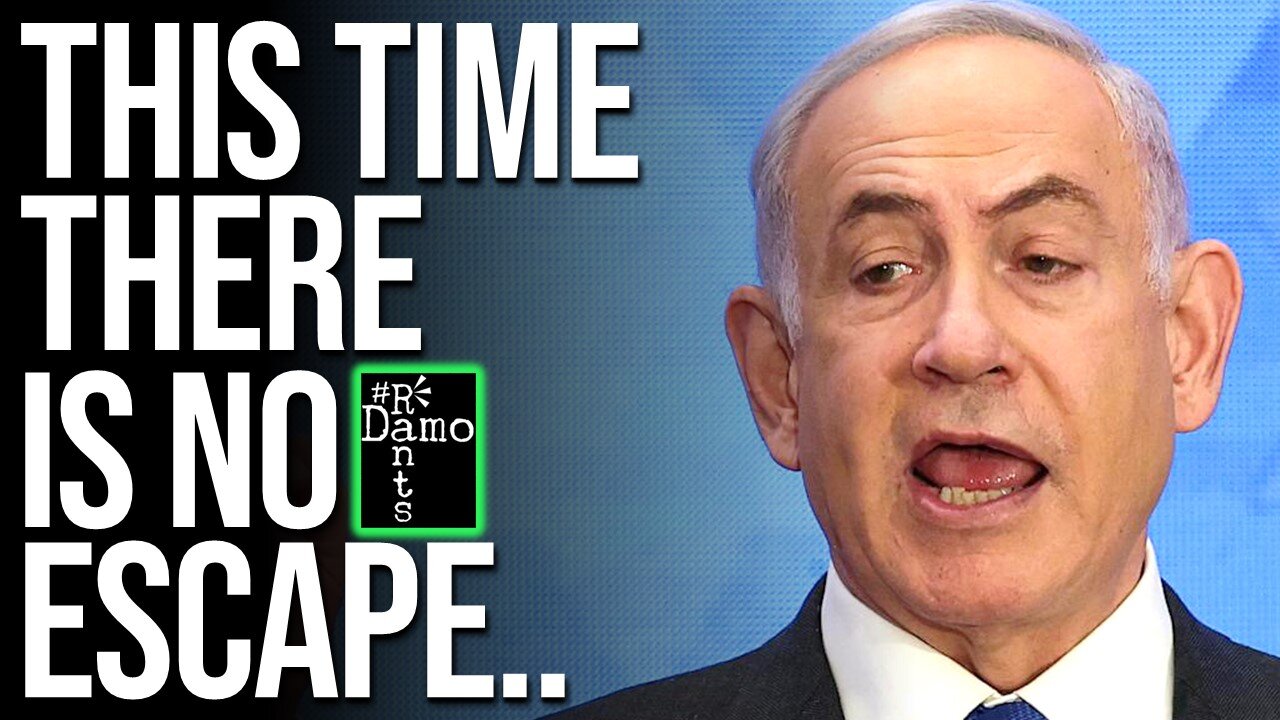Premium Only Content

Netanyahu's Coalition Suffers A Major Blow - And There's No Escape
Right, so Benjamin Netanyahu is a man who has built his political career on survival. For over three decades, he has weathered scandals, corruption trials, and military debacles with the skill of a political escape artist. But now, for perhaps the first time, he may be done for no matter what he does now. His coalition has now been pushed to the edge of collapse by a dispute that seems almost mundane compared to the wars raging in Gaza and the north: a military draft bill. United Torah Judaism (UTJ), one of Netanyahu’s coalition partners has just walked out, furious over reforms to ultra-Orthodox draft exemptions. Shas, the second major Haredi party, ultra Orthodox party, has threatened to follow, holding Netanyahu’s government hostage with an ultimatum he cannot easily meet.
This is not just another domestic spat. The coalition crisis is bleeding into Israel’s military posture and regional strategy. Paralysis now, reckless gambles later—Netanyahu’s political weakness is reshaping everything from Gaza to Lebanon to Iran. Whether he falls within weeks or clings to power into early 2026, this crisis marks a turning point: Israel’s wars are no longer being waged for strategic goals but for one man’s political survival and that one man may have finally just run out of moves.
Right, so the draft bill at the centre of this political storm is not merely a technical piece of legislation—it strikes at the heart of Israel’s social contract, one of the principles of Israel’s foundations, so its somewhat karmic that it may be such a thing that finally brings Netanyahu down. The Supreme Court’s June 2024 ruling, which declared blanket exemptions for ultra-Orthodox seminary students unconstitutional forced the government’s hand. Netanyahu introduced what he thought was a compromise bill, but its provisions have proven toxic to his ultra-Orthodox partners.
The proposed legislation sets a tiered enlistment quota for ultra-Orthodox men aged 18–24, aiming to draft approximately 3,000 Haredi recruits in the first year, rising to 6,000 annually within five years. It offers financial incentives for yeshivas whose students enlist and threatens budget cuts for institutions that fail to meet enlistment targets. Additionally, while it stops short of criminal penalties, it introduces civil sanctions: draft-eligible men who refuse to serve could lose access to certain government benefits, including housing and childcare subsidies.
To secular Israelis, the bill appears modest, even inadequate. Israel’s military manpower crisis—worsened by prolonged operations in Gaza and along the Lebanese border and elsewhere—has fuelled public resentment of what is perceived as Haredi privilege. Polling consistently shows broad secular support for stricter measures, with over 60% of Israelis favouring immediate universal conscription. The bill was Netanyahu’s attempt to placate this anger without alienating his ultra-Orthodox allies completely.
But to UTJ and Shas, the bill is viewed as a direct assault on Torah study, which they consider not merely a religious duty but an existential safeguard for the Jewish people. UTJ’s rabbis argue that yeshiva scholarship is a form of national service in itself, spiritually protecting the state, a foundational principle of the Israel I state as this is. The proposed financial penalties are interpreted as punitive measures against religious devotion, and the quotas are seen as the thin edge of a wedge that could eventually lead to full conscription. UTJ leaders fear that once the precedent is established, future governments could drastically increase quotas or introduce criminal penalties for draft evasion.
The symbolism of the bill is as damaging as its content therefore. For decades, Netanyahu has reassured the Haredi leadership that their autonomy would remain untouched under his rule. His willingness to even partially yield to secular pressure is seen by UTJ as a betrayal of that long-standing pact. Ultra-Orthodox newspapers aligned with UTJ have denounced the bill as “the first step toward dismantling the Torah world.” For their voters, whose entire communal identity is built on maintaining strict separation from secular civic obligations, the draft bill represents an existential threat.
Shas’s calculation is more complex but equally fraught. Unlike UTJ, which is an Ashkenazi Haredi party, Shas represents a broader Mizrahi religious base, many of whom are more integrated into mainstream Israeli life. Shas voters include both strictly ultra-Orthodox and more traditionalist Mizrahi Jews, some of whom serve in the military voluntarily. But the party’s leadership, and its rabbinical council, remain staunchly opposed to any erosion of yeshiva exemptions. For Shas Chairman Aryeh Deri, supporting the bill would risk alienating the ultra-Orthodox core of his electorate and provoke open rebellion within the party’s religious leadership.
Moreover, Shas fears being politically outflanked by UTJ. If UTJ positions itself as the uncompromising defender of the Torah world while Shas stays in government, Shas risks losing Haredi voters to its rival in the next election. UTJ’s dramatic walkout has already set the tone, increasing grassroots pressure on Deri to follow suit. Staying in government would make Shas look weak and complicit, while leaving would allow it to campaign as the party that refused to compromise on divine obligations.
The bill’s toxicity also stems from timing and optics. The Israeli public views the Gaza and northern border conflicts as national emergencies requiring maximum mobilisation. Netanyahu has framed the draft reform as a necessary security measure, angering Haredi leaders who argue that drafting yeshiva students in wartime is tantamount to declaring spiritual study expendable. UTJ and Shas see this as an unacceptable secularisation of state priorities—placing military necessity above Torah study, something their ideology fundamentally rejects.
Finally, for both UTJ and Shas, this is a battle for long-term precedent. Even if only modest quotas are set today, agreeing to the bill would signal acceptance of the principle that the state, not rabbinical authorities, has the ultimate say over yeshiva students’ civic obligations. That principle, once conceded, cannot easily be reclaimed.
For Netanyahu, the draft bill was supposed to be a carefully balanced compromise. Instead, it has become a political guillotine. UTJ’s departure was immediate, and Shas’s ultimatum has left Netanyahu with a stark choice: capitulate and roll back the bill, or face the government’s collapse. Either way, his authority has been shredded, and the ideological contradictions within his coalition are now impossible to paper over.
Netanyahu’s once-formidable political leverage has evaporated. With UTJ gone, he is down to a 61-seats in the Knesset, a 1 seat majority, making him vulnerable to every faction. Shas is now the ultimate kingmaker, and Aryeh Deri knows it. Deri is facing mounting pressure from Haredi voters who accuse him of failing to defend their way of life. If he remains in government without securing concessions, Shas risks being painted as collaborators with a secularist agenda. Leaving the coalition, on the other hand, would allow Shas to campaign in early elections as the defenders of religious autonomy—a narrative that could gain them seats. For Deri, staying loyal to Netanyahu is becoming politically suicidal.
UTJ, meanwhile, has left the door open for a return, complicating matters further, but only under humiliating conditions for Netanyahu. They will make demands you see. Such demands would not only likely require a complete rollback of the draft bill but also new guarantees of yeshiva funding and veto power over future reforms. Accepting these terms would hand UTJ disproportionate influence over government policy, which would enrage Netanyahu’s far-right partners.
The far-right bloc, sensing Netanyahu’s desperation, is escalating its demands. Smotrich wants accelerated settlement expansion, legalisation of West Bank outposts, and annexation moves. As Finance Minister, he holds a powerful budgetary weapon: he can withhold funds for Netanyahu’s priorities if ignored. Ben-Gvir now has the power to collapse the government on his own, he and his Otzma Yehudit party left once already over the last Gaza ceasefire you might recall, so you can definitely forget another one of those now and he is already leveraging his role as National Security Minister to demand harsher crackdowns on Palestinians and increased military action in Gaza. Both are already positioning themselves as the “real defenders of the Jewish state,” ready to brand Netanyahu as weak if he caves to the ultra-Orthodox.
Even Netanyahu’s own Likud is no longer united. Secular MKs like Nir Barkat and Yuli Edelstein are quietly manoeuvring for a post-Netanyahu future, aware that capitulating to Shas and UTJ could cost Likud votes in the next election. Netanyahu’s long-practised strategy of playing coalition partners off against each other is now impossible. Every partner can blackmail him, and all know he has no alternative allies to turn to.
If Shas leaves, Netanyahu’s government cannot survive for long. Political procedure offers him only temporary breathing space. Once Shas walks, opposition parties will move quickly to file a constructive no-confidence motion. This requires proposing an alternative prime minister, and opposition leaders Yair Lapid and Benny Gantz are already coordinating potential candidates.
Historically, no-confidence votes have failed when governments retained a solid right-wing bloc. But with Shas and UTJ gone, Netanyahu would be left with barely 50 seats—no path to blocking the motion. Within three to five weeks of Shas’s departure, the government would fall.
After a successful no-confidence vote, Netanyahu would remain as caretaker prime minister while elections are scheduled. By law, these must be held within 90 to 120 days, placing them in late December 2025 or early February 2026. Caretaker governments have historically been weak, focused on basic administration rather than strategic decisions, but with so much warfare going on would that even be possible? Israel’s enemies, aware of this, would exploit the vacuum.
Could Netanyahu buy time by delaying Shas’s exit? Possibly. Deri might remain in the coalition for a few weeks to extract maximum concessions. But unless Netanyahu fully reverses this draft bill now, Shas’s exit is almost inevitable. Even if he capitulates, the price of survival will be so high that his government may collapse later under far-right rebellion or Likud dissent.
The domestic political crisis is already affecting Israel’s war strategy. In the immediate term, Netanyahu is paralysed. Major new operations in Gaza or Lebanon require political unity, which is absent, so they wouldn’t happen.
In Gaza, Israel is likely to scale back large-scale offensives. Those plans for the Rafah “humanitarian city” for which read: concentration camp and expanded ground incursions may stall. Airstrikes and siege tactics will continue but are unlikely to achieve strategic gains. Hamas, sensing Israeli hesitation, may intensify its underground operations and propaganda, framing Israel’s paralysis as a victory for them.
On the northern front, this may benefit Lebanon immensely, with Israel in the south and the now pro-Israel Syria provoking from the East. Pressure on them would like ease, Hezbollah may even exploit the crisis through limited provocations, testing Israel’s readiness while avoiding full-scale war. Israel, meanwhile, will stick to defensive posturing to avoid triggering a conflict it would not be able to sustain politically.
The most volatile risk is Iran. If Netanyahu survives politically by appeasing Shas and UTJ, he may later turn to reckless military escalation to restore his security credentials. A high-profile strike on Iranian nuclear facilities again, which we already know he wants to do, even if strategically unwise, could serve as a political distraction ahead of elections. It could actually be the only move he has left, knowing what a crisis war with Iran triggered over just 12 days, but for a man who is all about himself and staying in power, he may decide he has nothing left to lose. But the IDF is already overstretched after months of Gaza operations, and on other fronts, this was after all the entire reason for the new draft bill, though this would hardly stop Netanyahu, who can quickly fly off to Greece, its what he did last time isn’t it? A failed operation as that would almost certainly be, would only accelerate Israel’s strategic decline.
The Houthis in Yemen and their Red Sea attacks represent a lower priority for now. Israel will likely continue defensive naval operations but avoid major escalation while distracted by domestic chaos, not that the Houthis would likely stop.
Israel’s coalition crisis is deepening its international isolation. The United States and European Union are quietly repositioning for a post-Netanyahu future. Washington has reportedly slowed certain arms approvals and increased contact with centrist figures like Gantz, anticipating an eventual transition.
Beyond Netanyahu’s personal drama lies a deeper crisis though. This coalition collapse highlights the structural dysfunction of Israel’s political system, increasingly dependent on ultra-Orthodox and far-right factions with conflicting agendas. The secular–religious divide is widening, fuelling societal fractures that threaten long-term political stability.
If elections are held, a Gantz or Lapid-led unity government is the most likely outcome. Such a government would probably pursue a more cautious foreign policy, seeking ceasefire arrangements in Gaza and avoiding direct confrontation with Iran.
However, Netanyahu’s legacy will outlast him. Settlement expansion, militarised occupation, and the empowerment of extremist factions are now entrenched. Even a centrist government may find reversing these trends politically impossible.
The Netanyahu era, defined by personalised rule and survival-at-all-costs politics, may now be ending. This could be the first nail in that coffin, but the divisions he deepened—between secular and religious Israelis, between Israel and its neighbours, between Israel and the international community—will remain for years. And certainly there is no going back on the eyes of the world being opened to Israeli apartheid and genocide.
Netanyahu has long been called a political survivor, but survival is no longer enough. Every path before him now leads to ruin: standing firm on the draft bill will cost him Shas and collapse his government, while capitulating will alienate his far-right partners and his own party. His political weakness is reshaping Israel’s wars, forcing caution now and inviting reckless gambles later.
Whether he falls tomorrow or months from now, his era in my view is effectively over. Maybe more war with Iran will prolong matters further, but it will only prolong the inevitable. The damage is done. Israel’s strategic position is weakening, its enemies are emboldened, and its wars are no longer fought for security but to prolong one man’s hold on power. The next government will inherit not just a political mess, but a fractured society and a very diminished state.
Meanwhile of course, today in fact, the Hague Group convenes in Colombia to discuss concrete action to take against Israel itself, by way of sanctions for the genocide of Gaza, the days of Israel’s impunity over, so it seems only fitting Netanyahu fall with that since he has become symbolic of it. Get all the details of what is making that meeting so important for Palestinians in this video recommendation here as your suggested next watch.
Please do also hit like, share and subscribe if you haven’t done so already so as to ensure you don’t miss out on all new daily content as well as spreading the word and helping to support the channel at the same time which is very much appreciated, holding power to account for ordinary working class people and I will hopefully catch you on the next vid. Cheers folks.
-
 LIVE
LIVE
Rallied
6 hours ago $5.28 earnedWarzone Challenges w/ Doc & Bob
10,766 watching -
 2:45:13
2:45:13
Barry Cunningham
6 hours agoCBS CAUGHT AGAIN! CHICAGO A MESS! LISA COOK IS COOKED AND MORE LABOR DAY NEWS!
30.6K12 -

Dr Disrespect
8 hours ago🔴LIVE - DR DISRESPECT - TRIPLE THREAT CHALLENGE - WINNING AT EVERYTHING
162K12 -
 54:40
54:40
BonginoReport
1 day agoLABOR DAY SPECIAL! The Best of Nightly Scroll - Nightly Scroll w/ Hayley Caronia (Ep.124)
70.2K6 -
 LIVE
LIVE
Spartan
4 hours agoNew Game+ on E33, then back to Halo Grind
66 watching -
 1:06:10
1:06:10
Russell Brand
8 hours agoThe Greatest Lie Ever Told? - SF625
51.8K84 -
 LIVE
LIVE
GrimmHollywood
5 hours ago🔴LIVE • GRIMM HOLLYWOOD • SKATE EARLY ACCESS • BRRRAP PACK • READY OR NOT •
77 watching -
 LIVE
LIVE
SavageJayGatsby
2 hours agoLet's Play: Pacific Drive || $300 Weekly Goal - Spicy Bite Saturday || Teen Drinkin is Very Bad
25 watching -
 LIVE
LIVE
blackfox87
2 hours agoWe Back Baby!! | PREMIUM CREATOR | #DisabledVeteran
93 watching -
 LIVE
LIVE
MadHouse_
1 hour agoFinsihing up the Main story and then some DLC.
24 watching